People working on the project
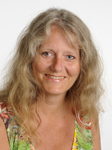 Kirsten Thisted (f. 1957) Associate professor at the department of Cross-Cultural and regional Studies. University of Copenhagen. Ph.D. 1994 Faculty of Humanities, University of Copenhagen. Master of Arts (1985 Mag. Art.) in Nordic Literature; Subsidiary subject in Eskimology (1990). (Co)Author/Editor of: From Oral Tradition to Rap: Literatures of the Polar North (2011); The Urban Arctic. Living Communities: New Perspectives On Inuit Urban Life (2009); Et postkolonialt Danmark. (2009); Grønlandsforskning. Historie og perspektiver (2005); Postkolonialisme (2004); Grønlandske fortællere. Nulevende fortællekunst i Grønland (2002); "Således skriver jeg, Aron". Samlede fortællinger og illustrationer af Aron fra Kangeq (1999); Jens Kreutzmann. Fortællinger og Akvareller (1997).
Kirsten Thisted (f. 1957) Associate professor at the department of Cross-Cultural and regional Studies. University of Copenhagen. Ph.D. 1994 Faculty of Humanities, University of Copenhagen. Master of Arts (1985 Mag. Art.) in Nordic Literature; Subsidiary subject in Eskimology (1990). (Co)Author/Editor of: From Oral Tradition to Rap: Literatures of the Polar North (2011); The Urban Arctic. Living Communities: New Perspectives On Inuit Urban Life (2009); Et postkolonialt Danmark. (2009); Grønlandsforskning. Historie og perspektiver (2005); Postkolonialisme (2004); Grønlandske fortællere. Nulevende fortællekunst i Grønland (2002); "Således skriver jeg, Aron". Samlede fortællinger og illustrationer af Aron fra Kangeq (1999); Jens Kreutzmann. Fortællinger og Akvareller (1997).
In this project Thisted examines how Greenlandic domestic and foreign policy is in transition from a language of resistance to a language of governance. The project involves a large historical material to illustrate the relationships between Greenlanders and Danes in colonial Greenland. The historical material provides a basis for understanding why the Greenlandic branding appears as mental decolonization and nation-building, and why narratives of equality and freedom seem to structure the debate about the use of natural resources in Greenland.
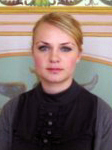 Ann-Sofie Nielsen Gremaud (b.1981) PhD from the Department of Arts and Cultural Studies, University of Copenhagen (2012), MA (Nordic Literature and Languages and Art History), University of Aarhus (2007), Board member of the PhD Board at the University of Copenhagen, reviewer at the journal NordEuropaForum (2011-2013), Kunsthistorisk Bogliste (2012) and evaluation coordinator at the Danish Agency for Culture (2012). From 2013 postdoctoral fellow at the Department for Cross-Cultural and Regional Studies, University of Copenhagen.
Ann-Sofie Nielsen Gremaud (b.1981) PhD from the Department of Arts and Cultural Studies, University of Copenhagen (2012), MA (Nordic Literature and Languages and Art History), University of Aarhus (2007), Board member of the PhD Board at the University of Copenhagen, reviewer at the journal NordEuropaForum (2011-2013), Kunsthistorisk Bogliste (2012) and evaluation coordinator at the Danish Agency for Culture (2012). From 2013 postdoctoral fellow at the Department for Cross-Cultural and Regional Studies, University of Copenhagen.
Ann-Sofie Gremaud undertakes the postdoctoral project: Geographies of Crisis. Post-industrial landscapes. The historical scope is 1920-2013, and focus is on issues concerning urbanization, economic- and environmental crises, globalization and marks of industrialisation on the landscape in selected academic articles and works of art from Iceland, Greenland and the Faroe Islands. These products reflect the relationship between nature and society in the current cultural changes where natural resources are associated with purity as well as industrial exploitation.
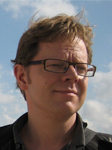 Bergur Rønne Moberg (b. 1965), Postdoctoral fellow (2012-15), External Lecturer Senior (2008-11), Postdoctoral fellow (2006-08) (funded by The Velux Foundation), PhD (2004), Magister Artium (1997) all in Scandinavian Studies at the Dpt. of Scandinavian Studies and Linguistics, University of Copenhagen. Exam. Art. (1985) in Nordic Language and Literature at University of The Faroe Islands. Visiting Scholar (2001) at School of Arts and Media, The University of New South Wales, Australia, Visiting Scholar (2013) at the Institute for World Literature at the Dpt. of Comparative Literature, Harvard University, US. Author of several books on Faroese literature and culture. In 2013 Moberg launches the book Resten i Vesten. Verdenslitteratur i modernismens margin ("The Rest in the West. World Literature in the Margin of Modernism") (2013).
Bergur Rønne Moberg (b. 1965), Postdoctoral fellow (2012-15), External Lecturer Senior (2008-11), Postdoctoral fellow (2006-08) (funded by The Velux Foundation), PhD (2004), Magister Artium (1997) all in Scandinavian Studies at the Dpt. of Scandinavian Studies and Linguistics, University of Copenhagen. Exam. Art. (1985) in Nordic Language and Literature at University of The Faroe Islands. Visiting Scholar (2001) at School of Arts and Media, The University of New South Wales, Australia, Visiting Scholar (2013) at the Institute for World Literature at the Dpt. of Comparative Literature, Harvard University, US. Author of several books on Faroese literature and culture. In 2013 Moberg launches the book Resten i Vesten. Verdenslitteratur i modernismens margin ("The Rest in the West. World Literature in the Margin of Modernism") (2013).
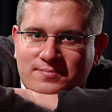 Ebbe Volquardsen (b. 1982), Magister Artium (2011) in Scandinavian Studies, European Ethnology and Political Science, Humboldt-Universität zu Berlin; 2008-2012 member of the editorial board of NORDEUROPAforum, since 2013 chief editor; since 2012 doctoral fellow at the Graduate Center for the Study of Culture (GCSC), Justus-Liebig-Universität Gießen; visiting scholar at the Department for Cross-Cultural and Regional Studies, University of Copenhagen (2013).
Ebbe Volquardsen (b. 1982), Magister Artium (2011) in Scandinavian Studies, European Ethnology and Political Science, Humboldt-Universität zu Berlin; 2008-2012 member of the editorial board of NORDEUROPAforum, since 2013 chief editor; since 2012 doctoral fellow at the Graduate Center for the Study of Culture (GCSC), Justus-Liebig-Universität Gießen; visiting scholar at the Department for Cross-Cultural and Regional Studies, University of Copenhagen (2013).
Ebbe Volquardsen undertakes the PhD project Danish narratives about a humane kind of colonialism. Cultural encounters and negotiations of identity in the light of an exceptional self-image, in which he analyses texts by Danish authors dealing with Danish colonialism in Greenland and the former Danish West Indies and investigates, how these texts contribute to the generation of the notion of an exceptionally benevolent colonialism as a part of Danish national self-image.
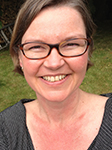 Anne Mette Jørgensen (b.1969) MA (anthropology) from Aarhus University (2002), and from October 2013 PhD student at the Department of Cross-Cultural and Regional Studies, University of Copenhagen and the National Museum of Denmark. Since 1996 a board member of the Nordic Anthropological Film Association. Project manager (2005-13) at the National Museum of Denmark on projects about cultural heritage and Denmark’s colonial history with a focus on West Africa and Greenland, respectively. Research interests in visual anthropology and documentary film, memory, colonialism and museums.
Anne Mette Jørgensen (b.1969) MA (anthropology) from Aarhus University (2002), and from October 2013 PhD student at the Department of Cross-Cultural and Regional Studies, University of Copenhagen and the National Museum of Denmark. Since 1996 a board member of the Nordic Anthropological Film Association. Project manager (2005-13) at the National Museum of Denmark on projects about cultural heritage and Denmark’s colonial history with a focus on West Africa and Greenland, respectively. Research interests in visual anthropology and documentary film, memory, colonialism and museums.
She undertakes the PhD project: Greenlandic Visual Memories in which she, by introducing film in her fieldworks, examines how visual memory is negotiated and revised. Focus is on modernization politics in Greenland and perceptions of nature as depicted in films commissioned by the Danish colonial administration in the 1930s. The project explores possibility spaces in fields between art and anthropology for renewed and dialogic forms of writing colonial and postcolonial history.
The project also involves the following partners:
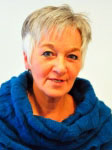 Birgit Kleist Pedersen (b. 1956), MA, Assistant Professor since October 1999, Associate Professor at the Department of Greenlandic Language & Literature since 2003. Vice-principal at Ilisimatusarfik/ University of Greenland (2005-07). Co-author of Grønlænder og Global – grønlandsk sprog, litteratur og medier i 25-året for Hjemmestyrets indførelse (2004).
Birgit Kleist Pedersen (b. 1956), MA, Assistant Professor since October 1999, Associate Professor at the Department of Greenlandic Language & Literature since 2003. Vice-principal at Ilisimatusarfik/ University of Greenland (2005-07). Co-author of Grønlænder og Global – grønlandsk sprog, litteratur og medier i 25-året for Hjemmestyrets indførelse (2004).
Birgit Kleist Pedersen contributes with knowledge about visual anthropology, studies in Greenlandic youth culture and symbolic ethnicity.
 Elisabeth Oxfeldt (b. 1966), PhD from the University of California, Berkeley, USA (2002), Professor of Scandinavian Literatur, Universitety of Oslo, Norway. Author of: Nordic Orientalism. Paris and the Cosmopolitan Imagination 1800-1900 (2005), H.C. Andersens eventyr på film (2009), Journeys from Scandinavia. Travelogues of Africa, Asia, and South America, 1840-2000 (2010), Romanen, nasjonen og verden. Nordisk litteratur i et postnasjonalt perspektiv (2012).
Elisabeth Oxfeldt (b. 1966), PhD from the University of California, Berkeley, USA (2002), Professor of Scandinavian Literatur, Universitety of Oslo, Norway. Author of: Nordic Orientalism. Paris and the Cosmopolitan Imagination 1800-1900 (2005), H.C. Andersens eventyr på film (2009), Journeys from Scandinavia. Travelogues of Africa, Asia, and South America, 1840-2000 (2010), Romanen, nasjonen og verden. Nordisk litteratur i et postnasjonalt perspektiv (2012).
Elisabeth Oxfeldt contributes with knowledge about Nordic orientalism, Norwegian history and West Nordic literary connections.
 Malan Marnersdóttir Malan Marnersdóttir (b. 1952) Dr.Phil. Aarhus University (2000) and Lic.Phil. Odense University (1986). Professor and Dean at Fróðskaparsetur Føroya, the University of the Faroe Islands. Fulbright Scholar University of Washington, Seattle 2006. Co-author of Føroysk bókmentasøga 1. Faroese Literary History. Nám (2011).
Malan Marnersdóttir Malan Marnersdóttir (b. 1952) Dr.Phil. Aarhus University (2000) and Lic.Phil. Odense University (1986). Professor and Dean at Fróðskaparsetur Føroya, the University of the Faroe Islands. Fulbright Scholar University of Washington, Seattle 2006. Co-author of Føroysk bókmentasøga 1. Faroese Literary History. Nám (2011).
Malan Marnersdóttir contributes with knowledge about translation studies and Faroese-Danish relations and literature.
 Guðmundur Hálfdanarson (b. 1956) PhD from Cornell University (1991) and cand. mag. in history, University of Iceland (1982). Jón Sigurðsson professor in history at the University of Iceland. Co-coordinator of the research network of excellence CLIOHRES, funded by the FP6 programme (2005–10). Author and editor of Discrimination and Tolerance in Historical Perspective (2008). Editor-in-chief of Scandinavian Journal of History (since 2010).
Guðmundur Hálfdanarson (b. 1956) PhD from Cornell University (1991) and cand. mag. in history, University of Iceland (1982). Jón Sigurðsson professor in history at the University of Iceland. Co-coordinator of the research network of excellence CLIOHRES, funded by the FP6 programme (2005–10). Author and editor of Discrimination and Tolerance in Historical Perspective (2008). Editor-in-chief of Scandinavian Journal of History (since 2010).
Guðmundur Hálfdanarson contributes with extensive knowledge about nationalism, environmental politics and changing views on Icelandic landscape in the light of nationalism.
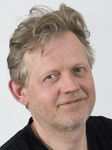 Sumarliði R. Ísleifsson (b. 1955) BA in history, University of Iceland 1984. MA in history, University of Iceland 1986. PhD studies in Univesity of Iceland (finsihing 2013).
Sumarliði R. Ísleifsson (b. 1955) BA in history, University of Iceland 1984. MA in history, University of Iceland 1986. PhD studies in Univesity of Iceland (finsihing 2013).
Project coordinator of INOR, Iceland and Images of the North. Co-author and editor of Iceland and Images of the North (2011).
Sumarliði R. Ísleifsson contributes with knowledge about internal and external images of Greenland and Iceland from the Middle Ages to the 19th century.
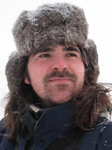 Andreas Otte (b. 1983) MA (Musicology), University of Copenhagen (2010). From 2011 PhD student at the Department of Cross-Cultural and Regional Studies, University of Copenhagen. PhD project “The music within Greenland and Greenland within the music”, financed by The Commission for Scientific Research in Greenland (KVUG), a project where connections between popular music and place are researched, primarily in an up-and-coming national perspective. How does popular music participate in the nation-building project, and can the nation as a project in fact work as catalyst for creativity among musicians.
Andreas Otte (b. 1983) MA (Musicology), University of Copenhagen (2010). From 2011 PhD student at the Department of Cross-Cultural and Regional Studies, University of Copenhagen. PhD project “The music within Greenland and Greenland within the music”, financed by The Commission for Scientific Research in Greenland (KVUG), a project where connections between popular music and place are researched, primarily in an up-and-coming national perspective. How does popular music participate in the nation-building project, and can the nation as a project in fact work as catalyst for creativity among musicians.
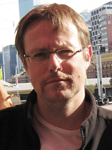 Ólafur Rastrick (b. 1969) PhD (history) from the University of Iceland (2012) and MA (anthropology) form Monash University, Australia (1998). Currently adjunct lecturer in ethnology/folklore and post-doctoral researcher at the Institute for History at the University of Iceland.
Ólafur Rastrick (b. 1969) PhD (history) from the University of Iceland (2012) and MA (anthropology) form Monash University, Australia (1998). Currently adjunct lecturer in ethnology/folklore and post-doctoral researcher at the Institute for History at the University of Iceland.
A book based on his doctoral dissertation is being published in 2013 by the University of Iceland Press, entitled Háborgin: Menning, fagurfræði og pólitík í upphafi tuttugustu aldar. [The Citadel: Culture, aesthetics and politics in early twentieth century Iceland]. His current research is on corporeal practices and discourses on the human body in interwar Iceland.
Ólafur Rastrick contributes with knowledge on Icelandic cultural and intellectual history, cultural heritage, and bodily practices, attitudes and strategies.
 Rosannguaq Rossen (b. 1982), roro@slm.uni.gl
Rosannguaq Rossen (b. 1982), roro@slm.uni.gl
MA (Cultural Studies & Media) from Ilisimatusarfik, University of Greenland (Feb, 2014).
Since June 2014 affiliated the Department of Greenlandic Language, Literature & Media as an assistant professor, including a PhD project: Cultural and National Symbols in modern Greenland. The project will focus on the connections between national and cultural symbols in modern Greenland primarily in the period between the establishment of the Home-Rule (1979) and the Self-Government (2009). How are the cultural and national symbols represented in design as part of nation building in Greenland?
Furthermore art historian Jørgen Trondhjem, political scientist Christian Rebhan, and historian Jens Heinreich are connected to the research project
